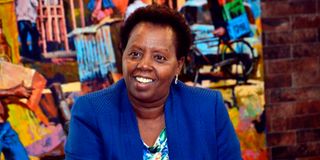Grassroots women rule the world, recognise them more

East African Breweries Limited (EABL) Managing Director and Chief Executive Officer Jane Karuku, during the interview at the company offices in Nairobi, on March 4, 2021.
What you need to know:
- Jane Karuku's appointment as managing director and CEO of EABL in December last year effectively made her the first woman CEO at the giant beverage manufacturer.
- To protect women’s jobs and provide a safe working environment, EABL established a strong ecosystem of support for its employees long before the Covid-19 pandemic struck.
- “I’ve never been undermined or treated differently. But to be heard, I’ve had to be courageous like everyone else on the table,” she says.
Jane Karuku was stepping into big shoes when she was appointed managing director and CEO of East African Breweries Limited (EABL) in December last year. This appointment effectively made her the first woman CEO at the giant beverage manufacturer.
Four months later, Ms Karuku has taken on her role with as much sense of purpose as aplomb and humour. Her beguiling laugh and demeanour nearly mask the weight of responsibility on her shoulders.
As the world marked the International Women’s Day (IWD) on Monday, Ms Karuku noted that she celebrated life, good health, family and friends.
“Having lived through the Covid-19 pandemic, having a job and having my organisation still standing, in spite of all we went through, are my biggest wins,’’ she says.
With this year’s IWD campaign theme #ChoosetoChallenge, the trailblazer says she’s challenging intentional and unintentional biases against women.
“We need to be deliberate about how we’d like women to contribute to organisations. We must also overcome the barriers that make this goal difficult through a culture change and training.”
The pandemic has devastated economies and cost livelihoods for millions across the world. This year, the pandemic will push 47 million more women to extreme poverty, the UN projects, raising the figure to 435 million women globally.
To protect women’s jobs and provide a safe working environment, EABL established a strong ecosystem of support for its employees long before the pandemic struck.
Work flexibly
“We constantly provided education through our health consultants, provided safety gear and allowed our women to work flexibly from wherever they are,” Ms Karuku says.
In what ways will Covid-19 change the outlook on women leadership? She believes the pandemic has been a reset for organisations, noting that collaborative working, agility and communication will be key to business recovery.
She adds: “Its values of empathy, compassion and multi-skilling that women bring on board that helped us to survive the pandemic.”
On emerging stronger, she emphasises the need to address consumers in a balanced approach. “We must change the way we advertise, for instance, because our consumers are 50/50. How we direct our ads and who is featured must reflect our consumers.”
To that effect, most EABL billboards and ads today, feature women. Women too, constitute a significant percentage of the company’s ambassadors for various brands, in what she describes as “progressive portrayal”.
There are now more women heading private companies and government institutions than there were 25 years ago. Their roles too, have changed, from marketing and HR to more ‘hard-core’ ones such as administration and finance.
Ms Karuku couldn’t be prouder.
Progress upwards
“What this does is to open doors and to break the stereotype that women can’t do these jobs,” she notes.
On safeguarding these gains, the CEO argues that the challenge is “to ensure that the funnel doesn’t shrink so much as women progress upwards” and to be fair in the recruitment and promotion processes.
“Organisations too, need to have a reliable support system where women feel comfortable enough to give their best,” she says. The environment should also be flexible to allow them to be mothers and daughters as well.
But even as the number of women executives rise, limitations remain rife. On dealing with her limitations, Ms Karuku says she vowed from the outset, to see herself as a professional first, then as a woman.
“This has made me more confident and eliminated distractions. I don’t have to behave differently. I’m a leader who must do what needs to be done.”
Often, the conversation on women leadership inclines toward corporate. Ms Karuku argues that this further perpetuates bias against women who make equally worthy contributions in other avenues such as the arts, education and community work.
“Women, especially at the grassroots, are the best mobilisers. They rule the world. Let’s recognise them and their roles more,” she appeals.
As a leader, difficult conversations have been a central part of her career, and while most of the voices have been male, Ms Karuku says she has been treated with respect by her colleagues.
“I’ve never been undermined or treated differently. But to be heard, I’ve had to be courageous like everyone else on the table.”
At 61 and at the peak of her career, women in Kenya and across the region look up to her for inspiration. Her inspiration, she says, comes from sometimes the most modest of places.
Political seats
“It could be a child at the supermarket who’s persistent about getting an item. Other times it’s a colleague who’s diligent in their work. I’m always self-aware to learn from my environment.”
That the country has been debating the rule of two-thirds for the last ten years is progress, she assesses.
“Many women in Kenya today don’t want to contest for political seats because it’s rough. They want to lead, but they also want to preserve their dignity as family women and mothers. But can they make good politicians? Yes, they can,” she says, adding that women must step forward and be counted.
She doesn’t think Kenya is doing enough. “We must improve the quality of women leadership. It’s imperative to create and implement the right structures.”
It’s one thing to have women in leadership and another to have quality leadership from them. Her verdict? “It’s indisputable that women leadership is good. Even at the family level, it’s mostly women who call the shots. It’s only at the corporate level that this hasn’t been well realised.”
Ms Karuku notes that countries that have done well globally, both economically and in the fight against Covid-19, are women-led. These include Germany (Angela Merkel) and New Zealand (Jacinda Ardern).



